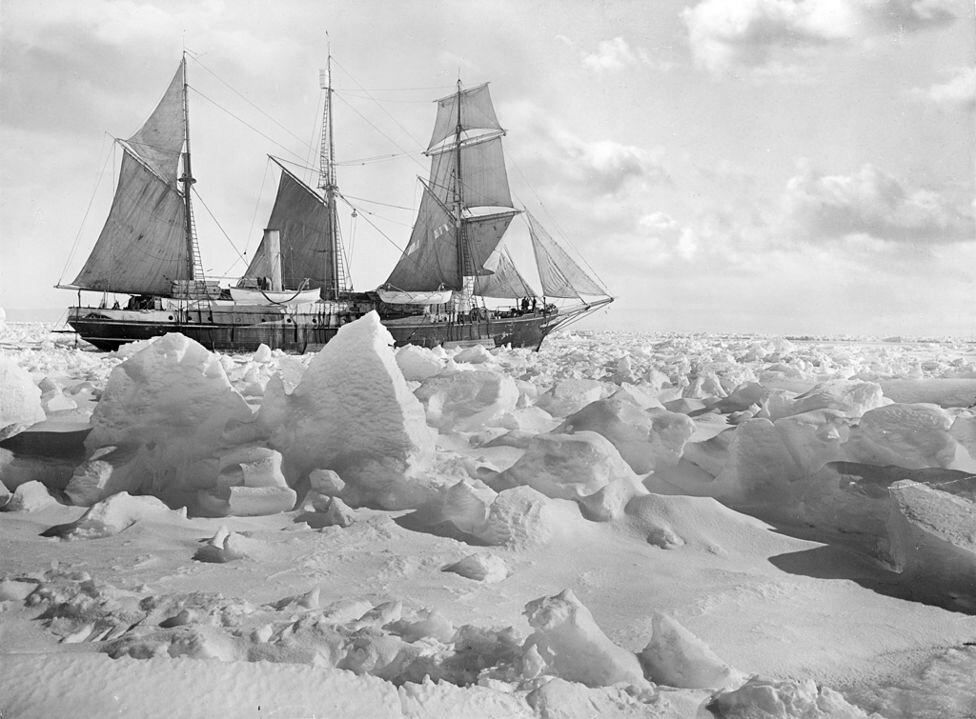Endurance: Shackleton's Incredible Voyage | GoodReads
Want to read this book? Get it here.
10/5 ⭐️'s: An exciting, epic battle of survival; Stoicism to the nth degree. Truly incredible. 🏆
“The ship had been named the Polaris. After the sale, Shackleton rechristened her Endurance, in keeping with the motto of his family, Fortitudine Vincimus—"By endurance we conquer."
Endurance: Shackleton's Incredible Voyage
Easily one of my all-time favorite books—ever—it's not hard to see why astronaut Scott Kelly brought it with him to the ISS not once, but twice. Although I hazily remembered Shackleton's voyage from history class, it wasn't until Kelly's Endurance: A Year in Space, A Lifetime of Discovery that Alfred Lansing's book was brought to my attention. Both books are amazing, dealing with life and death situations outside of civilization, on the forefront of exploration.
If you enjoy true tales of adventure, heroism, and strength of character in the face of insurmountable odds—look no further. Sir Ernest Shackleton's Imperial Trans-Antarctic Expedition is nothing short of extraordinary.
The introduction alone was so striking, I listened to it four times. Narrated by Simon Prebble, it reads like the BBC Planet Earth documentaries, beautiful and riveting.
Earnest Shackleton
Stuck in "the icy wasteland of the Antarctic's treacherous Weddell Sea, just about midway between the South Pole and the nearest known outpost of humanity, some 1,200 miles away," the ship Endurance is abandoned a little more than a year after setting out from London in 1914.
All in all, the group of 28 men (all of whom survive) will have no contact with the outside world for almost two years, and not see land for 497 days. No radio, no satellite, no help from anywhere, only the guidance of maps, stars, and the indefatigable leadership of Ernest Shackleton.
"Thus their plight was naked and terrifying in its simplicity. If they were to get out—they had to get themselves out.”
After the Endurance sinks, the men take the sled dogs, lifeboats, and anything they can carry, setting out across the ice. Throughout their journey back to the known world, I found myself holding my breath and constantly amazed at how the men could endure such trials—even attaining a level of contentment with their primitive existence.
"The rapidity with which one can completely change one's ideas ... and accommodate ourselves to a state of barbarism is wonderful."
Developing a degree of self-reliance greater than they ever thought possible, it is clear the men take the time to savor the pleasure of simply being alive. Lansing seamlessly incorporates diary entries from the men, giving us incredible insight to the men's personal feelings.
Several camps are made on the ice, the last aptly named: "Patience Camp." Once the ice floes begin to break up, the men set out for the South Shetland Islands in two small boats, eventually landing on Elephant Island. Too weak to go on, a majority of the men remained there while Shackleton and five others set off in the James Caird for South Georgia. Covering a distance of 800 miles through the Drake Passage it is widely viewed as one of the greatest small-boat journeys ever undertaken.
Once they reached King Haakon Bay, Shackleton and two others made the first confirmed land crossing of the South Georgia interior, arriving at the whaling station of Stromness. The men there are in shock and utter awe at the strength and determination of Shackleton and his men. As soon as he can, Shackleton goes back and rescues the rest of his party.
I often referenced maps of the expedition and ended up researching the various legs of the journey in greater detail—the photos alone are captivating. The whole story is phenomenal, and awe-inspiring—I really can't recommend this enough.
Favorite Quotes:
“In some ways they had come to know themselves better. In this lonely world of ice and emptiness, they had achieved at least a limited kind of contentment. They had been tested and found not wanting.”
“In that instant they felt an overwhelming sense of pride and accomplishment. Though they had failed dismally even to come close to the expedition's original objective, they knew now that somehow they had done much, much more than ever they set out to do.”
The Endurance. More stunning images from Shackleton's voyage can be found here.



